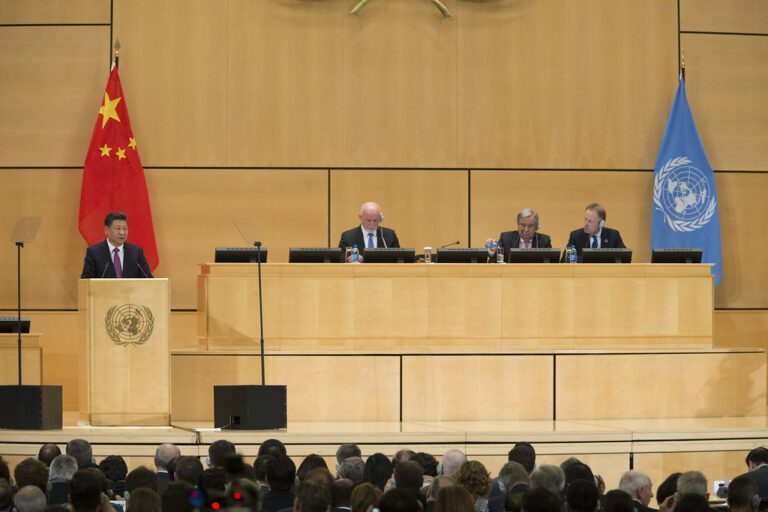Adding Turbulence to the Turbulent Region: Cooperation Between Western Balkans, China, and Taiwan

The article is published as part of a joint issue “Green Synergies: Sustainability, Security, and Taiwan-Europe Collaboration” between CHOICE and the University of Nottingham’s Taiwan Insight.
The geopolitical and economic landscape of the Western Balkans has long been shaped by great power competition, with new actors emerging in recent years. As external actors seek to exert their influence in this region – traditionally shaped by its proximity to the European Union – both Russia and Turkey have maintained a notable presence. In the past 15 years, China has significantly increased its involvement, creating a context in which potential cooperation with Taiwan remains markedly limited – though not entirely absent. Constrained by the One-China policy and facilitated through unofficial channels, cultural exchanges, and economic interests, Western Balkan countries have yet to fully explore the potential of cooperation with a rising democratic and technological power like Taiwan.
China and the Western Balkans: Strategic Engagement through the BRI
China’s engagement with the Western Balkan region intensified following the 2012 launch of the China and Central and Eastern Europe cooperation framework (originally known as the 16+1, then 17+1, and now, following the withdrawal of several EU member states, 14+1). While not EU members, Serbia, Bosnia and Herzegovina, Montenegro, North Macedonia, and Albania have become strategic nodes for China’s Belt and Road Initiative (BRI) in Europe. The 14+1 effectively serves as the BRI’s extension in Central and Eastern Europe. China’s interests in the region are threefold: extending political influence, securing logistical and infrastructural footholds, and fostering trade and investment opportunities. However, cooperation between China and the Western Balkan countries has not been uniform, with significant variation in the depth of these bilateral relationships.
Serbia has emerged as China’s flagship partner in the region. Often described as a “steel friendship” by officials in both countries, the relationship is underscored by significant Chinese investments in infrastructure, energy, mining, and heavy industries. Chinese banks – most notably the Export-Import Bank of China – have provided favorable loan arrangements for such projects, frequently tied to Chinese contractors and labor. This partnership continues to evolve, with Serbia having become the first (and so far, only) European country to sign the declaration on the “Community with a Shared Future” during Xi Jinping’s visit to Belgrade in May 2024.
Other Western Balkan countries have had either limited or no significant engagement with China. The smallest country in the region, Montenegro, nearly fell into a “debt trap scenario” in 2021, prompting a more cautious approach toward Beijing. Montenegro’s experience with China set alarm bells ringing in the EU and the broader international community. Other countries in the region have largely defined their position toward China in line with their (mostly) transatlantic orientation. As both Albania and North Macedonia are NATO members committed to the process of European Integration, Chinese push toward closer relations remains limited. Meanwhile, Kosovo, is not recognized as an independent country by Beijing due to its stance on territorial integrity and close relationship with Belgrade, which actively works on disputing Kosovo’s statehood.
Despite the growing presence, Chinese influence in the Western Balkans is not without friction. EU institutions have repeatedly raised concerns over the lack of alignment with European standards, particularly in public procurement and state aid transparency.
Taiwan and the Western Balkans: Diplomatic Constraints, Soft Power, and Emerging Interest
Taiwan’s engagement with the Western Balkans is notably constrained by the region’s adherence to the One-China policy – a prerequisite for diplomatic relations with Beijing. None of the Western Balkan countries formally recognize Taiwan or maintain official diplomatic missions in Taipei. Nonetheless, informal exchanges and low-level cooperation do exist, particularly in trade, education, technology, and humanitarian aid.
Taiwan’s economic footprint in the region is limited, but not negligible. Taiwanese companies, especially in the IT and manufacturing sectors, have shown intermittent interest in entering the Western Balkan markets, though market size, institutional fragility, and China’s overshadowing presence pose challenges. In countries like North Macedonia and Albania, Taiwanese firms have explored opportunities in the electronics, machinery, and textile sectors – though these efforts remain fragmented and lack the strategic depth of China’s initiatives.
Soft power and people-to-people diplomacy are at the core of Taiwan’s regional engagement. Academic scholarships, cultural exchanges, and technology forums hosted by Taiwanese institutions foster grassroot connections. Taiwanese representatives also tend to reach out to political party members and civil society actors, which is often met by strong reactions from Chinese diplomats, leading to mixed outcomes of such initiatives.
While prospects for formal cooperation remain limited, niches for increased engagement exist – particularly in areas like digital innovation, democratic governance, and sustainability, where Taiwan holds comparative advantages and reputational capital. The key challenge lies in navigating these opportunities without triggering diplomatic fallout from China.
China’s Role in Green Technologies
Following its 2021 pledge to halt overseas construction of coal-fired power plants, China has shifted the focus of its foreign investment toward green infrastructure. This transition has had a significant impact on the Western Balkans, where several major coal projects like Tuzla 7 (Bosnia and Herzegovina), Pljevlja (Montenegro), and Kostolac B3 (Serbia), were either halted or restructured. Caught unprepared for this pivot, many regional governments scrambled to devise alternative clean energy strategies.
China’s global green energy strategy has spurred a wave of renewable investments across the region. In Montenegro, Chinese firms have participated in solar and wind energy development projects, as well as the pollution-control retrofitting efforts at the Pljevlja thermal power plant. Serbia, China’s most significant partner in the region, secured a €2.2 billion investment in 2024 from Shanghai Fengling and Zijin Mining for a 1,500 MW wind farm, a 500 MW solar facility, and a green hydrogen plant – largely aimed at decarbonizing the Zijin copper mine in Bor. In parallel, an energy-focused MoU with Hunan Rich Photovoltaic Science and Technology, signed in 2023, set the stage for further Chinese-backed ventures, including a 1 GW solar panel factory and an adjacent 200 MW solar power plant. These projects align with Serbia’s ambition to become a regional solar supplier and hydrogen hub, while also deepening its dependence on Chinese capital and technology.
Dependency and Governance Concerns
Although Chinese investments have enabled the region’s green transition, they pose considerable risks. Chief among them is a lack of transparency. For instance, the Kostolac B3 project was awarded without a public tender through a state-to-state agreement, prompting criticism for bypassing standard procurement practices. This form of financing is often termed “corrosive capital,” due to its negative impact on governance standards. There are also concerns about regulatory compliance, as several Chinese-led projects have clashed with the EU environmental laws.
Another concern is technological dependency. Chinese green technology projects often come as turnkey packages – including solar panels, wind turbines, and control software – leaving recipient countries reliant on Chinese suppliers for maintenance and upgrades. While these packages are sometimes more financially attractive than Western alternatives, they come with trade-offs such as reducing supplier diversity, limiting local capacity building, and increasing Beijing’s political leverage.
Taiwan’s Emerging Potential
In contrast to China, Taiwan’s engagement with the Western Balkans has been modest in previous years. Although formal diplomatic ties are constrained by the One-China policy, economic cooperation exists in some areas. Taiwanese automotive manufacturer Mei Ta built a large-scale factory in Serbia, showcasing Taiwan’s potential as a high-tech investor in the region – though it must be noted that this investment, similarly to those from Hong Kong and Macao, is listed as “Chinese investment” by the National Bank of Serbia.
Taiwan is one of the global leaders in solar photovoltaics and smart grid technologies. Institutions like Academia Sinica continue to develop advanced solar cells, having achieved solar cell efficiency exceeding 30 percent, while national investments in offshore wind and grid modernization efforts have positioned Taiwan as a knowledge hub for energy transition. Taiwan has also been expanding its own renewable capacity. As of late 2023, it had 12 GW of installed solar capacity, with a target of 20 GW in the near future.
Taiwan’s semiconductor industry – accounting for 15 percent of its GDP – is critical for enabling energy efficiency across smart grids, electric vehicles, and battery management systems. Collaborating with Taiwan could thus help the Western Balkans access cutting-edge clean technologies while helping to diversify the region’s technological dependencies away from China.
Strategic Diversification through Balanced Partnerships
As the Western Balkans strive to modernize their energy systems and align with EU climate goals, they face a dual challenge: leveraging Chinese investment without becoming overly dependent, and diversifying partnerships to enhance strategic resilience. China will likely remain a dominant economic actor in the region, but its green investments bring governance risks, debt concerns, and technological lock-in.
Taiwan, while operating on a smaller scale, offers a promising alternative. Through cooperation in solar energy, semiconductors, smart infrastructure, and battery technology, Taiwan can support the region’s green transition while reinforcing democratic values and supply chain security, especially as it is already well integrated with Western partners. Quiet but deliberate expansion of such cooperation could help the Western Balkans navigate an increasingly complex geopolitical landscape.
Written by
Stefan Vladisavljev
vladisavljev_sStefan Vladisavljev is CHOICE Visiting Fellow. He is also the Program Coordinator of the Serbia-based non-governmental organization Foundation BFPE for a Responsible Society. He analyzes Chinese presence in Central and Eastern Europe with a special focus on Serbia and the Western Balkans.
Damir Dizdarević
Damir Dizdarević is a Program Coordinator of the Belgrade based non-governmental organization Foundation BFPE for a Responsible Society.


